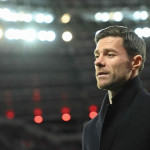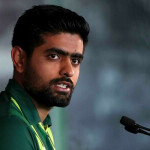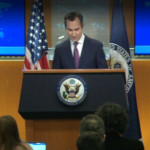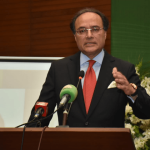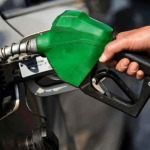Russia's election on Sunday saw President Vladimir Putin win in a record-breaking post-Soviet landslide, solidifying his already firm hold on power and demonstrating that Moscow was correct to defy the West and send soldiers into Ukraine.
Putin, a former lieutenant colonel in the KGB who came to power in 1999, made it plain that the outcome should serve as a warning to the West's leaders that, in peace or conflict, they will have to deal with a more powerful Russia for many years to come.
As a result, Putin, 71, will begin a new six-year term that, should he finish, will surpass Josef Stalin's record of 200 years as Russia's longest-serving leader.
According to an exit survey conducted by pollster Public Opinion Foundation (FOM), Putin received 87.8% of the vote, the most percentage of any candidate in Russia's post-Soviet history. Putin was ranked 87% by the Russian Public Opinion Research Center (VCIOM). According to the initial official findings, the polls were correct. Due to censorship and the imprisonment of political opponents, the United States, Germany, the United Kingdom, and other countries have declared that the vote was not free nor fair.
As a result, Putin, 71, will begin a new six-year term that, should he finish, will surpass Josef Stalin's record of 200 years as Russia's longest-serving leader.
According to an exit survey conducted by pollster Public Opinion Foundation (FOM), Putin received 87.8% of the vote, the most percentage of any candidate in Russia's post-Soviet history. Putin was ranked 87% by the Russian Public Opinion Research Center (VCIOM). According to the initial official findings, the polls were correct. Due to censorship and the imprisonment of political opponents, the United States, Germany, the United Kingdom, and other countries have declared that the vote was not free nor fair.
When Putin took the stage, his admirers chanted, "Putin, Putin, Putin," and once he finished his acceptance speech, they chanted, "Russia, Russia, Russia."
Thousands of opponents of Putin demonstrated against him at polling places both domestically and internationally at noon, spurred on by opposition leader Alexei Navalny, who passed away in an Arctic prison last month.
Putin told reporters that he thought Russia's election was democratic and that the protest against him, which was sparked by Navalny, had no bearing on the result of the vote.
He added that Navalny's demise had been a "sad event" in his initial remarks following his death, and he affirmed that he had been prepared to carry out a prisoner swap including the opposition figure.
Putin criticized the American political and legal systems in response to a question about whether his reelection was democratically conducted by NBC, a US TV network.
He declared, "What is happening (in the United States) is being laughed at by the entire world." "This is not a democracy; this is just a disaster."
His question seemed to be a reference to the four criminal proceedings that Republican nominee Donald Trump was facing. "Is it democratic to use administrative resources to attack one of the candidates for the presidency of the United States, using the judiciary among other things?" he said.
The Russian election takes place a little more than two years after Putin ordered the invasion of Ukraine, which set off the worst conflict in Europe since World War Two.
The three-day election has been clouded by war as Ukraine has been attacking Russian oil refineries, shelling Russian areas, and attempting to breach Russian borders with proxy forces, all of which Putin has threatened to punish.
Putin stated that in order to stop such attacks in the future, Russia could have to establish a buffer zone inside Ukraine.
Given his dominance over Russia and the lack of serious opponents, Putin's reelection appeared certain, but the former KGB operative wanted to demonstrate the enormous support of Russians.
When the polls closed at 1800 GMT, the national turnout was 74.22%, exceeding the 67.5% recorded in 2018, according to election officials.
The number of Russians who participated in the opposition marches, which were well guarded by tens of thousands of police and security personnel, was not independently calculated. Russia has 114 million voters.
At midday, Reuters journalists witnessed long lines of several hundred or perhaps thousands of people at polling places in Moscow, St. Petersburg, and Yekaterinburg, as voters, particularly younger ones, began to arrive.
Even though there were few obvious indicators that set them apart from other voters, some claimed to be protesting.
Russia saw at least 74 arrests on Sunday, according to OVD-Info, a watchdog organization that tracks repression of opposition.
There have been sporadic protests over the past two days, with some Russians setting voting booths on fire or pouring green dye inside ballot boxes. Pictures of tampered ballots with anti-Putin inscriptions were shared by opponents.
However, the opposition has lost its most powerful leader with Navalny's passing, and other significant opposition members are either dead, imprisoned, or abroad.
Putin is portrayed by the West as a murderer and an authoritarian. Putin, according to Ukrainian President Volodymyr Zelenskiy, intended to rule for ever, and the vote was invalid.
Putin frames the conflict as a centuries-old struggle against a collapsing West that, in his words, degraded Russia by intruding upon its sphere of influence following the Cold War.





